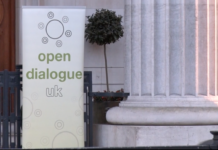European Expert Group Calls for Investment in Community Based Services
In Europe, millions of people live in segregated institutional settings, excluded from mainstream society. Without adequate, person-centered support in the community, institutionalisation will sadly continue.
What Would a Trauma-Informed Society Look Like?
Imagine if we, as a society, started recognizing trauma, pain, grief, fear, the need for connection and understanding, and oppression without defensiveness or denial. What if, hypothetically, we saw the signs in people who were "defiant," "withdrawn," "oppositional," "depressed," "manic," or otherwise as desperate pleas to have their needs met, and stopped telling them they were sick for doing so? What would a society that actually encouraged expression of emotion, compassion, and empathy look like?
Eat Breathe Thrive: Chelsea Roff on Eating Disorders, Trauma, and Healing with Yoga and...
Chelsea Roff is the Founder and Director of Eat Breathe Thrive (EBT), a non-profit with an inspired mission to bring yoga, mindfulness, and community support to people struggling with negative body image and disordered eating. I reached out to Chelsea to learn more about her life and organization, which she writes, “…is like AA for people with food and body image issues, plus yoga and meditation.” Chelsea shared her journey from life as a patient to yogi, author, and innovative community organizer. With her permission, you can find this interview below.
Effective Tactics for the “Rehumanizing Resistance”: Real Politics 101, Part Two
In Part Two, I discuss strategy and tactics for the Rehumanizing Resistance, including: (1) Traditional, Personal, and Underground Politics; (2) Direct Action and Confrontation: When It Can and Cannot Succeed (3) Organizing: Taking Advantage of the Current Cultural Climate; (4) Alliances and Coalitions; and (5) Film and Media. In Part One, I discussed how the Resistance has been winning scientific battles but losing the war against the expansion of influence of First-Order Psychiatry (which includes American Psychiatric Association and Big Pharma), and how this is due in large part to the First-Order’s effective political tactics and the Resistance’s political naivety.
Please Join Groundbreaking Research on Psychiatric Medications
Psychiatric medications such as antipsychotics and antidepressants account for a huge number of published research studies. This existing research, however, is almost exclusively constrained within a medical model approach, purporting to evaluate medications as treatment for biological brain disorders, and designing studies accordingly. The disease, and how medications presumably affect it, is at the center — with pharmaceutical company financial interests not far behind. That paradigm is starting to change.
In Praise of Patience as a Prescription for Trauma
For Aeon, Samira Thomas writes that while resilience is attracting a lot of attention from psychology, patience in an underexplored and undervalued virtue in...
Mindfulness Therapy May Be More Effective Without Antidepressants
While an estimated 74-percent of patients diagnosed with major depression receive a prescription for an antidepressant, new research reveals that mindfulness-based cognitive therapy (MBCT)...
“New Course on ‘Making Sense’ of Trauma, Creating a Coherent Narrative”
PsychAlive is releasing a new blog and e-course on “Making Sense of Your Life,” with psychologists Lisa Firestone and Dan Siegel. They draw upon the...
In Honor of Fear and Pain
Our use of antidepressants has turned single-episode struggles that recovered 85% of the time within one year, never to recur, into chronic and debilitating disorders that hold patients hostage in their own arrested development. But, If you are in the hole of pain, here’s what I have to say to you. It’s what I say to my patients, and what I tell myself in times of struggle.
Do We Really Need Mental Health Professionals?
Professionals across the Western world, from a range of disciplines, earn their livings by offering services to reduce the misery and suffering of the people who seek their help. Do these paid helpers represent a fundamental force for healing, facilitating the recovery journeys of people with mental health problems, or are they a substantial part of the problem by maintaining our modestly effective and often damaging system?
Truth and Reconciliation: An Evening of Sharing and Healing
On Wednesday, March 20, 2016, Rethinking Psychiatry collaborated with The M.O.M.S. Movement and The Icarus Project to host our first Truth and Reconciliation Circle for Receivers and Givers of Psychiatric and Mental Health Services. In this three-hour event, both receivers and givers of psychiatric and mental health services expressed their thoughts and feelings in a structured, facilitated environment.
Psych Patients Who Resist Stigma Do Better
A new study in press in the Journal of Schizophrenia Research finds that patients who actively resist the negative stigma associated with mental health...
Group Mindfulness Shows Promise Reducing Depression Associated with Hearing Voices
A new study out of Kings College London found that twelve sessions of a group mindfulness-based therapy relieved distress associated with hearing voices while reducing depression over the long-term. The person-based cognitive therapy (PBCT) intervention had significant effects on depression, voice distress, voice controllability and overall recovery.
“New Counseling Toolkit Helps Boys and Girls Club Address Kids’ Real-Life Issues”
The staff at Minneapolis’ Southside Village Boys and Girls Club are implementing a specially targeted free interactive counseling toolkit designed by a team of volunteers...
The Psychiatry Sandcastle Continues to Crumble
Psychiatry would long since have gone the way of phrenology and mesmerism but for the financial support it receives from the pharmaceutical industry. But the truth has a way of trickling out. Here are five recent stories that buck the psychiatry-friendly stance that has characterized the mainstream media for at least the past 50 years.
“California Courts Step Up Oversight of Psychotropic Medication Use in Foster Care”
The Mercury News reports that California’s judicial council is taking major steps to address the rampant use of psychiatric drugs in foster care. The...
Dear Self-Proclaimed Progressives, Liberals and Humanitarians: You’ve Really Messed This One Up
When it comes to psychiatric diagnosis, I can be almost certain that anyone outside of my immediate field of work just won’t ‘get it,’ no matter where they stand on anything else. And not only won’t they get it; they will often actively be one of the unwitting oppressive masses, either through their inaction or worse.
Finding Clarity Through Clutter
For the last three years, I have been working with people, labeled "hoarders," who have become overwhelmed by their possessions in their homes. This has been some of the most interesting, challenging and thought-provoking work I have ever done. It is also an area that, I think, highlights all of the issues that challenge us in helping people who feel overwhelmed, for whatever reason.
Victim Blaming: Childhood Trauma, Mental Illness & Diagnostic Distractions?
Why, despite the fact that the vast majority of people diagnosed with a mental illness have suffered from some form of childhood trauma, is it still so difficult to talk about? Why, despite the enormous amount of research about the impact of trauma on the brain and subsequent effect on behaviour, does there seem to be such an extraordinary refusal for the implication of this research to change attitudes towards those who are mentally ill? Why, when our program and others like it have shown people can heal from the effects of trauma, are so many people left with the self-blame and the feeling they will never get better that my colleague writes about below?
“Brain Changes Seen in Veterans with PTSD after Mindfulness Training”
Veterans with PTSD experience observable changes to the brain after mindfulness training, according to new research published in Depression and Anxiety. “The brain findings suggest...
Simple Things
Sometimes it's the simple things that keep us going, especially when the complicated ones seem so overwhelming; when there's too much chaos, too many emotions, too many possibilities and impending disasters. No one can give you a reason to live. You have to find it for yourself. Until you do, try simple things. For me, it was a turtle.
“Meditation Plus Running as a Treatment for Depression”
“Meditating before running could change the brain in ways that are more beneficial for mental health than practicing either of those activities alone,” Gretchen...
Exercise Effective for Early Psychosis, Studies Show
A new study out of the University of Manchester found that personalized exercise programs reduced the symptoms for young people suffering from their first episode of psychosis. Researchers also conducted an accompanying qualitative analysis and found that the participants experienced improved mental health, confidence, and a sense of achievement and felt that autonomy and social support were critical to their success.
Love is Dialogical: The Open Dialogue UK International Conference and Training
In the past five years, there has been a dramatic explosion of interest in the Open Dialogue Therapy practiced in Tornio, Finland. It is a humanistic “treatment” that has produced five-year outcomes for psychotic patients that are, by far, the best in the developed world, and there are now groups in the United States, Europe and beyond that are seeking to “import” this care. However, the challenges for doing so are many and, last month, Open Dialogue UK - on the occasion of the first-ever fully recognized Open Dialogue training outside of Tornio - organized a conference in London to hold an open dialogue about Open Dialogue.
Regarding the Impossibility of Recovery
Popular illness narratives tend to be of the restitution sort: I was living my life, I became sick, I got well and picked up where I left off. However, this idea that ill health is a journey to wellness doesn’t help someone with a chronic illness or disability to tell her own story, which may not have a (conventional) happy ending. The notion of ‘recovery’ can be damaging when a return to health may not be possible.












